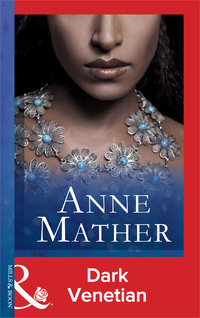Książki nie można pobrać jako pliku, ale można ją czytać w naszej aplikacji lub online na stronie.
Czytaj książkę: «Dark Venetian»

Mills & Boon is proud to present a fabulous
collection of fantastic novels by
bestselling, much loved author
ANNE MATHER
Anne has a stellar record of achievement within the
publishing industry, having written over one hundred
and sixty books, with worldwide sales of more than
forty-eight MILLION copies in multiple languages.
This amazing collection of classic stories offers a chance
for readers to recapture the pleasure Anne’s powerful,
passionate writing has given.
We are sure you will love them all!
I’ve always wanted to write—which is not to say I’ve always wanted to be a professional writer. On the contrary, for years I only wrote for my own pleasure and it wasn’t until my husband suggested sending one of my stories to a publisher that we put several publishers’ names into a hat and pulled one out. The rest, as they say, is history. And now, one hundred and sixty-two books later, I’m literally—excuse the pun— staggered by what’s happened.
I had written all through my infant and junior years and on into my teens, the stories changing from children’s adventures to torrid gypsy passions. My mother used to gather these manuscripts up from time to time, when my bedroom became too untidy, and dispose of them! In those days, I used not to finish any of the stories and Caroline, my first published novel, was the first I’d ever completed. I was newly married then and my daughter was just a baby, and it was quite a job juggling my household chores and scribbling away in exercise books every chance I got. Not very professional, as you can imagine, but that’s the way it was.
These days, I have a bit more time to devote to my work, but that first love of writing has never changed. I can’t imagine not having a current book on the typewriter—yes, it’s my husband who transcribes everything on to the computer. He’s my partner in both life and work and I depend on his good sense more than I care to admit.
We have two grown-up children, a son and a daughter, and two almost grown-up grandchildren, Abi and Ben. My e-mail address is mystic-am@msn.com and I’d be happy to hear from any of my wonderful readers.
Dark Venetian
Anne Mather

MILLS & BOON
Before you start reading, why not sign up?
Thank you for downloading this Mills & Boon book. If you want to hear about exclusive discounts, special offers and competitions, sign up to our email newsletter today!
Or simply visit
Mills & Boon emails are completely free to receive and you can unsubscribe at any time via the link in any email we send you.
Table of Contents
Cover
About the Author
Title Page
CHAPTER ONE
CHAPTER TWO
CHAPTER THREE
CHAPTER FOUR
CHAPTER FIVE
CHAPTER SIX
CHAPTER SEVEN
CHAPTER EIGHT
CHAPTER NINE
CHAPTER TEN
CHAPTER ELEVEN
CHAPTER TWELVE
CHAPTER THIRTEEN
CHAPTER FOURTEEN
Copyright
CHAPTER ONE
THE man climbed silently out of the water, his tight black rubber suit gleaming wetly, like sealskin, in the pale light of a waning moon. He stood motionless for a moment, listening but the only sound was the gentle lap-lap of the water against the sides of the cemented wharf. He looked down at the murky depths of the canal, and half-smiled to himself, before melting back into the shadows, seeking the darkness of the warehouse behind him. The warehouse was filled with crates of fruit, waiting to be loaded in the morning, and there was the sweet smell of fruit and wooden packing cases, which banished the kind of damp atmosphere present in the building.
The man strode behind a pile of crates, removing his goggles and breathing apparatus, and stripping off the skin-fitting suit expertly. In a matter of seconds he had bundled his gear into an empty guitar case, all except the oxygen tanks which were concealed under some bagging. Then he slid his arms into the jacket of the lounge suit he was wearing, deliberately fastening his tie with studied movements, mentally slowing himself down. Then, he emerged, the guitar case in his hand, a cigarette between his lips.
He opened the door of the warehouse silently, glanced once up and down the deserted wharf before stepping out and closing the door behind him. He walked easily away along the quay, his footsteps masked by rubber-soled shoes.
Count Vidal Cesare climbed negligently out of the gondola, paid the gondolier, and walked indolently across the landing stage to the pillared gateway of the courtyard of the Palazzo Cesare.
A faint pink glow on the horizon heralded the dawn of a new day, gilding the many spires and campaniles of the city, turning the waterways from grey to pink. A muted murmur in the distance, and the city was slowly coming to life; soon the canals would teem with craft of all kinds, gondolas, motoscafi (motorboats) and the small steamboats called vaporetti which ferried you to your hotel if you were a visitor arriving at the railway station on the Grand Canal.
But to Count Cesare the city was his home, and he had long since explored every inch of it from the Doge’s Palace to the little known church of San Francesco della Vigna.
The Palazzo Cesare was built round three sides of the small courtyard into which Count Cesare entered now, but the courtyard had been left untended for so long that it was encrusted with moss and weeds, and climbing plants ran riot over the grey stone walls.
The façade of the Palazzo was still intact, and still maintained some of the glory of a bygone age. Typically Venetian in design, its loggias were laced with openwork carvings, and had at one time been gilded although much of this now had worn away. Yet it was still imposing and could have been vastly renovated to its earlier glories had the Cesare family remained as affluent as their ancestors.
An iron-studded door led into the lower hall which at this early hour was as cold as the waters of the canal itself, and smelt faintly musty. A stone and marble staircase swept grandly up to the first floor, where from the long room which ran from the front to the back of the Palazzo, apartments had been modernized for the Count and his grandmother, the Dowager Contessa, who were the only surviving members of the Cesare family.
Apart from this suite of rooms which by normal standards were spacious and luxurious in appointment, the remainder of the Palazzo was unfurnished, and unattended, and was gradually deteriorating from damp and decay. Occasionally, Count Cesare felt the pangs of regret that this state of affairs should be allowed to continue, but short of marrying an heiress, he did not see any chance of them being changed. And although Count Cesare was not averse to dalliance with the opposite sex, as were all his countrymen, he had not as yet met any woman who even allied with a fortune might make him surrender his bachelor status. He supposed one day he would have to marry, if only to continue the Cesare line of sons to carry on the family name, but it amused him to have eligible females thrust into his notice by doting mothers to whom a title meant everything. But, as he had said before, what was the point of buying the fruit when it was there for the taking?
The Contessa despaired of the life he led, nights spent gambling or wenching, as she put it, and he was used to accusatory lectures in the light of the morning.
At eighteen Vidal Cesare had been orphaned, and pushed unceremoniously into his position as Count Cesare, and head of the Cesare family, and with a fortune at his finger tips he had gone a little mad.
But all that was in the past. There was no way of redress, and the future was, as ever, nebulous. Such experience as he had gained had stood him in good stead over the years that followed, and the Count of today had no illusions about the world in general and women in particular. He had learned to play the game so skilfully pursued by his contemporaries, and had in his turn become skilled and sometimes unscrupulous in his dealings with the kind of society that seemed at times to resemble the complex laws of the jungle.
He entered a small ante-room which gave on to a large light room furnished as a lounge, whose wide windows gave a picturesque view of the quiet canal outside, and its meeting with the wider, more important waterway which wound round the maze of alleys, palaces, tiny squares, churches and market places.
The lounge with its amber-coloured carpet and dark furniture was neither modern nor antique in design. Comfortable low green velvet-covered armchairs and couches, were placed beside examples of sculpture, retained by his grandmother from an original collection of sculpture and paintings which had long since been sold. A charming full-length statue of a Roman prince occupied a prominent position, an appealing marble relief of two heads by a sculptor famous in the late sixteenth century, and a bust of a priest which Count Cesare personally abhorred. The walls, hung with tapestries, mocked a twentieth-century television set and cocktail cabinet, while the low coffee table was definitely French. In the window embrasure was a dropleaf table in polished wood and it was here that the Count, when he was at home, and his grandmother ate their meals, and at this early hour of a little after five-thirty, it had been laid in readiness for the Contessa’s breakfast by Anna, the housekeeper, whose husband, Giulio, was the general handyman around the Palazzo. They were the only two servants to be retained, and they were nearing retiring age. The Contessa would never dream of asking them to leave and getting younger staff; they had been with her for over forty years and had known Count Cesare since his birth.
Count Cesare loosened his tie a trifle wearily, and crossed the lounge to the door of his dressing-room. He undressed, showered, and then slid lazily between the silken sheets of the enormous four-poster bed in the massive bedroom which had been the master’s bedroom since time immemorial.
He fell asleep almost immediately, and was awakened at eleven-thirty by Anna swishing back the long velvet curtains unceremoniously, letting in a stream of sunlight which caused Count Cesare to groan and turn over, burying his face in the soft pillows.
‘Anna!’ he exclaimed in exasperation. ‘What are you doing?’
Anna, small and fat and good-natured, and dressed in her usual black, swung round and smiled at him, cheerfully.
‘The Contessa is waiting to speak to you,’ she replied, folding her hands over her white apron. ‘She has something of importance to tell you, and she can wait no longer.’
Count Cesare ran a lazy hand through the thick darkness of his hair, and then reluctantly levered himself up in the huge bed.
‘The coffee is on the table beside you,’ said Anna, pointing, ‘and there are rolls and butter, still hot from the oven, if you want them.’
‘Dear Anna, what would I do without you?’ remarked Count Cesare sardonically, as he poured himself a cup of black coffee from the silver jug, and added two lumps of sugar.
Anna shrugged her plump shoulders. ‘I have run your bath, and placed a change of clothes in your dressing-room,’ she continued, as though he had not spoken. ‘Is there anything else you require, signore?’
Count Cesare shook his head. ‘No, thank you, Anna. As always you have anticipated my every wish.’ There was a smile in his light blue eyes and Anna allowed a gentle indulgence to appear momentarily. For her, the Count Vidal Cesare could do no wrong.
‘Very well, signore.’ She withdrew and Count Cesare slid out of bed, wrapping a dark blue silk dressing-gown about him. Pouring another cup of coffee, he walked into the adjoining bathroom to take his bath unhurriedly.
When he emerged into the lounge some time later, he found his grandmother seated at her bureau writing some letters. Although the Contessa was almost eighty she was as agile-minded as ever, despite the fact that her body would no longer obey her every command. Crippled periodically by rheumatism, she still managed to maintain the air of a grand duchess, and no one who came into contact with her could fail to be intimidated by her sometimes forbidding manner. And yet, to those to whom she took a liking, she could prove to be a good friend, and although her grandson caused her many hours of concern, he was still the most important person so far as she was concerned, and his happiness, and the necessity of providing the Cesare family with an heir were always uppermost in her mind.
She was dressed today in a pale mauve silk two-piece, with several strings of pearls about her rather sinewy throat. Small, and slender, until one saw her eyes one would not consider her at all formidable, but those pale blue orbs revealed the flame within, and could wither one with a glance.
As Count Cesare entered the room, she moved round in her chair to look at him, her eyes bright and piercing in their scrutiny.
‘Well, Cesare,’ she said bleakly. ‘So you have decided to honour us with your presence at last!’
Count Cesare shrugged his broad shoulders and reached for a cigarette before replying. ‘As always, Grandmother, you attempt to intimidate. What can be so urgent that I must be aroused from my bed at this hour of the morning?’
As he had anticipated, his provocative remarks infuriated the old lady. ‘It is almost lunchtime,’ she exclaimed angrily. ‘If you did not spend all your nights wasting your time in some nightclub or casino or other you would not need to lie in bed until this time! Your way of life appals me, Cesare, and I dare not think what might happen if I should die leaving you to manage your own affairs….’
‘I manage my affairs very well, thank you,’ remarked Count Cesare indifferently, and flung himself into a low armchair, lifting a copy of the daily paper.
‘Cesare! Listen to me!’ The Contessa clenched her fists angrily. ‘Have you no conception of the honour of your family? Have you no decency? Don’t you care for me at all?’
Count Cesare flung aside the paper. ‘Very well, Contessa, what is it you have to say?’
The Contessa rose to her feet, drawing herself up to her full five feet two inches. Folding her hands, she said:
‘We are to have visitors at the Palazzo.’
‘What!’ At last she had aroused his interest. Count Cesare’s eyes were narrowed, and he looked not at all pleased.
‘Yes, Cesare, visitors.’ The Contessa looked rather smug now. She had taken his attention completely, and ever the dramatist, she intended to hold the stage for just a little longer. ‘You will not perhaps recall Joanna Dawnay. She and I attended school in Paris together many, many years ago. We were great friends, and even after our schooldays were over we corresponded regularly. Then, when I married your grandfather, Joanna was one of my attendants.’
Count Cesare began to look a little bored. ‘So? This woman … she is coming to stay here?’
‘Ah, no. Joanna I am afraid died, some fifteen years ago.’
‘Then get to the point,’ said Count Cesare impatiently.
The Contessa smiled. ‘I will, Cesare, I will.’ She linked her fingers together thoughtfully. ‘Joanna did not marry until quite late in life, and the man she married was not by any means a rich man. Her parents had had a little money, but that had died with them, so naturally Joanna had to marry someone, in order to survive.’
‘She could have got a job,’ remarked Cesare dryly, unable as yet to see any point in all this story.
‘Ah, not almost forty years ago. Girls of Joanna’s upbringing did not “get jobs”, they married someone. So Joanna married Henry Bernard, an English parson, and went to live somewhere in the south of England. And some five years later she produced a daughter, Celeste, to whom I acted as godparent. Is my story becoming a little clearer?’
‘No.’ Cesare was blunt.
‘Ah, well, it will soon. Celeste was an adorable child, although I saw little of her after her eighteenth birthday. Joanna died, as I have already told you, and Henry Bernard had little time for anyone with money. So contact was temporarily severed, but occasionally Celeste wrote to me, and I replied, and from her letters I have gathered a little of her life story. When she was only twenty years of age she married a man already in his forties, a widower with one child, a girl of perhaps seven years of age. Unfortunately, this husband of hers was killed in a road accident when they had been married for only ten years, and Celeste was left with a seventeen-year-old stepdaughter and no money of any consequence.’
‘Money is not everybody’s yardstick,’ remarked Cesare idly. ‘Some people are extremely happy without any at all.’
‘Tch!’ The Contessa was scornful. ‘I have not noticed that you share that view. You seem to run through your money without any visible signs of a struggle.’
Cesare smiled. ‘That is my concern,’ he said softly, and only his grandmother was aware of the slender veneer of patience he was controlling.
‘Very well. In any event, it is not important now. Let me continue with my story; Celeste is not a woman to be dashed by circumstances. No, instead of falling into a rut, she gained an invitation for herself and her stepdaughter to visit a distant cousin in the United States of America, and there she married again, this time a rich industrialist. Unfortunately, however, this man, Clifford Vaughan, was quite elderly when she married him, and he died only two years after their marriage leaving Celeste a wealthy woman at last.’
‘How convenient,’ said Cesare dryly. ‘And I suppose she loved him very much!’
The Contessa shrugged. ‘I doubt it; it is not important. If she married him for his money knowing full well he would not live very long, who am I to judge her? I admire her. She is a woman after my own heart.’
‘Heart!’ Cesare shook his head. ‘And how much heart have you if you can countenance a marriage for mercenary gains only?’
The Contessa smiled. ‘My dear Cesare, that is the only kind of marriage you are likely to make, is it not? So pray do not criticize me!’ Cesare rose negligently to his feet. ‘That is a little different. I do not intend marrying some old hag, not even for a fortune.’
‘No. And it is right that you should not. Old hags could not bear you strong sons, sons to carry on the name of Cesare.’ She fingered her pearls thoughtfully. ‘No, Cesare, you should marry Celeste Vaughan!’
Cesare stared incredulously at the Contessa. At last her schemes were revealed, the reason for the comprehensive life story he had just listened to with complete disinterest. She had introduced him to girls before, but this time every circumstance had been weighed and found perfect. The woman was young, but not too young; charming, or so the Contessa believed; and rich, which to the Contessa Francesca Maria Sophia Cesare, was the most important thing of all. Her life-long desire was to restore the Palazzo, and to actually see it happening before she died was all she asked of what remained of her life; that and a great-grandson.
Count Cesare shook his head. For a moment, the completely unexpected statement had thrown him off balance; momentarily he thought only of his own feelings in the matter. But now realization of what this might mean came flooding back to him, and he was necessarily more abrupt than he had intended.
‘It is ludicrous!’ he said coldly. ‘And if our visitors are to be this woman, and her stepdaughter, then I suggest you quickly contact the postal services sending a cablegram to England, or the United States, wherever they might be, informing them that circumstances beyond your control forbid such a visit at this time, or you may find there is no longer a Count Cesare at this address!’
But his words did not have the expected reaction.
‘It’s too late,’ she replied complacently. ‘They are already staying at the Danieli, and I telephoned a welcome to them this morning, inviting them to stay here as long as they wish!’
Darmowy fragment się skończył.








